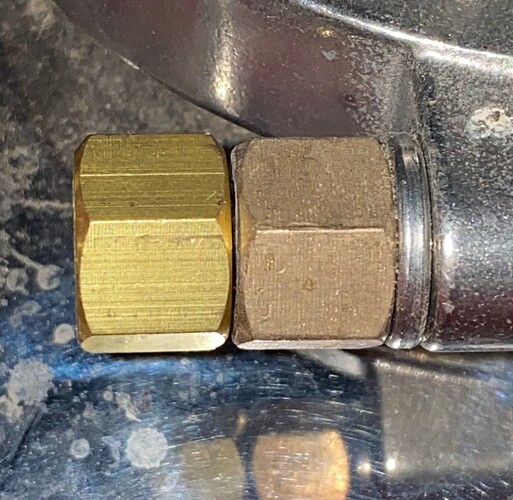So just curious if it’s safe to use stainless steel nuts on my high pressure clamps? I noticed people they can seize from the cold but I’m only putting them on parts that I don’t take off frequently.
So galling, a form of adhesion or wear caused between two sliding surfaces…happens with like material typically…so stainless nuts and bolts would see some of that potentially.
Stainless steel nuts will wear out the threads on your bolts. You want brass because it’s not as hard as stainless.
Cheaper to replace just the nut, than the nut and the bolt.
It’s not just the cold or thermal expansion/contraction, stainless really wants to cold weld itself to other stainless (“galling”) unless there’s a bunch of anti-seize or other EP lubricant keeping the 2 pieces sliding past each other from sticking.
Proverbs 27:17 You use steel to sharpen steel, and one friend sharpens another.
I tried to switch in 2017, dont do it.
You will regret it when you have to do a full clean out. As said the nut is cheaper to replace but if your looking for the extra safety that comes with a stainless nut just put a 2nd brass nut to act as a backing nut.
I always remember Horatio’s (RIP Buddy!) incident when we talk about these brass nuts, replacing them can save a life, no joke!
The reason why brass nuts crack is due to the fact that brass (or all metals for that matter) gets more brittle as the temperature drops. At around -30 they can easily crack if they’ve got too much load on them.
If it’s on a part of your system that gets that cold, maybe stainless nuts and some anti seize wouldn’t be a bad option.
https://www.tf.uni-kiel.de/matwis/amat/iss/kap_9/illustr/s9_1_1.html
Suggest avoiding the anti-seize in fear of contamination, especially near the material column.
I have totally over tightened my fair share of brass nuts but never cracked a brass one, I extract @ -60 frequently, the only part ive seen go on a brass nut is the threads
As long as you use anti-seize it will work. The specialty ASME-rated clamps by LJStar use stainless nuts.
I’ve seen it happen one time when a colleague confused in/lbs with ft/lbs. It didn’t cause a leak but I noticed the nut was split down the side when we were disassembling the system.
I have had a brass nut break in half. Only once…
Happened during set up and was able to just swap it out. Thankful it wasn’t in a run.
LJ Star also offers anti galling clamps that use Nitronic 60 bolts with 316 nuts. They aren’t cheap though.
316 bolts with silicon bronze nuts still seems to be the best option for how often we disassemble or change clamps.
Those nuts are silicon bronze?
We use brass as well. It varies from supplier, but silicon bronze is a better option. Brass tends to be shinier and silicon bronze is a bit dull.
Good to know. Ever since I saw that nut crack I’ve been religiously replacing the nuts.
I keep any metal scraps so I can use it for different projects. It’s nice to know I can turn my horde of silicon bronze nuts into filler rods.
Versatile but expensive as hell at retail prices.
Silicon Brass Nuts only
After having the threads strip/rip out on a brass nut mid run a couple years ago, I switched to grade 5 steel nuts and bolts for all my high pressure clamps. No problems since.
Grade 5 gang gang
I thought that but the only thread failure i had was on the bolt and not the brass nut. It couldve been from times where i tightened or loosened one side and it bound.
You damaged the bolt. Brass is certainly softer than stainless steel.
